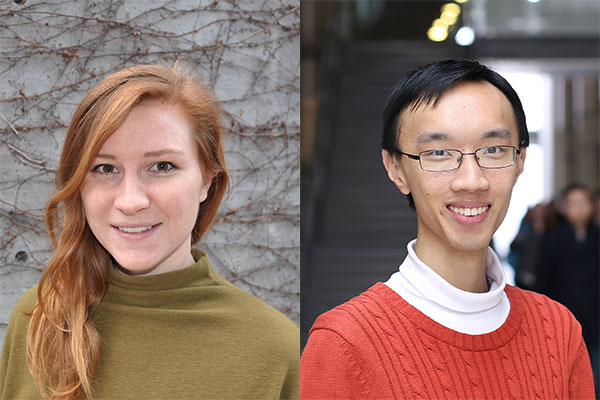 May 2, 2016 — Whether they are increasing student engagement or providing opportunities to work across disciplines, these U of T Engineering graduate students aim to improve engineering education both in Canada and around the world.
May 2, 2016 — Whether they are increasing student engagement or providing opportunities to work across disciplines, these U of T Engineering graduate students aim to improve engineering education both in Canada and around the world.
Kirstin Newfield (CivE PhD candidate) and Alan Fong (MIE MASc candidate) are enrolled in the Collaborative Program in Engineering Education (EngEd). Launched in 2014, the EngEd program allows master and doctoral students from either U of T Engineering or the Ontario Institute for Studies in Education (OISE) to join the small community of scholars immersed in research and learning at the nexus of education and engineering practice. The program is the first of its kind in Canada.
Students apply to the program through their home departments, but are brought together at a weekly seminar course where they share ideas and discuss theoretical foundations, methods and topics related to engineering education. Students also take a core course that introduces them to engineering learning, knowledge, assessment, and culture and community.
“Our educational methods need to evolve to meet society’s changing needs — we can’t hope to educate the engineers of tomorrow using the teaching approaches of yesterday,” says Professor Greg Evans (ChemE), director of the EngEd program. “The EngEd program builds on the innovative work that many professors from U of T Engineering and OISE are already doing, and will help us find and shape tomorrow’s best practices.”
Fong aims to increase student engagement with undergraduate lectures by leveraging the trend of “gamification,” which involves adding fun elements derived from video games — like point scoring or competition — to daily life.
Many popular smartphone apps make use of gamification to encourage activities that might otherwise feel like work, from physical fitness to learning a new language. Fong believes that gamification can also help address the culture shock many students experience in their first year of university.
In addition to his computer engineering degree from U of T, Fong holds a bachelor of education and spent a year teaching high school physics and mathematics for the York Region District School Board. There, he became very aware of the difference in teaching styles between secondary and post-secondary education institutions.
“In high school, we check homework and make sure students are studying for tests,” says Fong. “In contrast, many university courses have only two summative evaluations: the midterm test and the final. It’s very easy for students to put off studying, then cram just before the test.” Unfortunately, this approach does not lead to good retention of concepts.
Fong thinks one way to keep students engaged on a regular basis is to look at how they are rewarded for class participation. “Marks are one kind of currency,” he says. “I wonder if it’s possible to create another type of currency.”
For example, Fong knows a professor who uses “learning bucks” as a reward for asking questions in class or otherwise actively participating. Learning bucks can be spent on a larger self-made aid sheet for the midterm, or to waive the class’s one-day-late penalty.
Fong plans to use MIE 242 Psychology for Engineers, taught by his supervisor Professor Mark Chignell (MIE), as a testing ground for his gamification ideas. “We want to create a framework that other instructors can use, regardless of what they teach,” says Fong. “We hope it will provide them with a new tool to keep students more engaged with the material.”
Read more at U of T Engineering News.